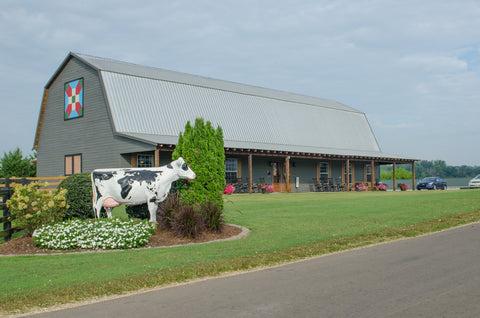Love Thy Farmer: Sweetwater Valley Farm

Words by Jennifer Kornegay
Sweetwater Valley Farm sits on a grassy hill overlooking Highway 11 as it cuts through southeastern Tennessee. With its columned white home and tin-topped gray barn as focal points, it composes a classic bucolic scene of a family-owned dairy in the South. But it’s also a cheddar lover’s nirvana and one that welcomes all passersby to turn off the road, wind up the drive past the welcoming black and white cow, and immerse themselves in more than 30 varieties of cheddar (plus a few goudas) that the dairy makes from its fresh milk and sells onsite.
The Seed to Sandwich Café in the barn features a fromage-forward menu, where grilled cheese sandwiches—such as the #allthecheese, a melty mash-up of six kinds—take center stage and homemade soups and creamy milkshakes play supporting roles.

In the farm store, huge windows at the back give a behind-the-scenes look at the process that turns out mild, sharp, extra sharp and reserve cheddar, as well as flavored varieties including chipotle, pesto, hickory smoked, and roasted garlic, which are waiting under domes alongside stacks of toothpicks, ready for sampling. A wall of coolers holds blocks of cheeses for purchase. And for those craving knowledge to go with their cheese, SVF also leads guests on daily dairy tours.
All combined, the offerings pull cars off the highway in droves. And that’s exactly what John Harrison envisioned when, in 1998, he expanded the small dairy he and his wife Celia had bought into in 1987. He comes from a long line of Tennessee dairy farmers and has always enjoyed farming’s rhythms. He’s also proud to partner with mother nature in bringing milk to the masses. But while he enjoys communing with his cows, he was left longing for a deeper connection with his customers.
“That’s how we moved into cheese,” Harrison’s daughter and Sweetwater Valley Farm’s marketing director Mary Lyndal Harrison says. “We were originally just selling our milk to Mayfield, but dad wanted to sell something directly to and interact more with the public and show people how a dairy works.”

Today, SVF provides a comprehensive experience. “You can tour the farm, see the cows, see where we make cheese, taste the cheese, eat lunch at the café, and buy cheese to take home,” Mary Lyndal says.
Along with a brother and sister, Mary Lyndal makes three of the five Harrison kids who’ve joined their parents in the family business. She didn’t really see the move coming but now knows it was the right choice. “I moved away for school and realized I am just a big homebody, while also realizing how cool the farm is,” she says. “I knew then that I wanted to be a part of it.” Once she got back home, her passion only grew.
She does a little bit of everything when needed, but her focus is on running the store and café, on giving tours, and on promoting and sharing the farm’s story, particularly the chapters outlining the advances it uses to ensure comfy cows and therefore, premium milk and cheeses. “I want everyone to know more about how their food is made and understand what’s behind quality dairy,” she says.
It starts with the land—3,500 acres of undulating fields and pockets of forest growing the hay, oats, barley, and corn crops that feed 3,500 head of cattle, mostly Holstein dairy cows but some beef cattle too. Each animal’s specific diet depends on its age. “We work with a nutritionist to give them exactly what they need to thrive,” Mary Lyndal says. They spend a good bit of their time in a free-stall barn, protected from the elements (and misted and fanned in the heat of summer) but still having space to roam and beds for resting. “This system lowers stress, which means they produce more milk,” she says. And unlike the olden days of milk maids on a short stool laboring to squeeze out milk, SVF uses automatic milkers, and now, robotic milkers. “This lets the cows just do their thing, and they go to the milkers when they are ready,” Mary Lyndal says. “It’s a newer system for dairy and is another way to lessen the stress on our cows. We were the first in Tennessee to use it, and we love showing this aspect to the public on our tours.”

With calmer, happier cows comes more and better milk, and the girls at SVF currently yield 54 million pounds of milk each year, some of which is transformed into 300,000 pounds of cheese annually, the majority some form of cheddar. “Cheddar is actually pretty simple to make, but it has to age a long time, so it’s not fast,” Mary Lyndal says.
She knows it’s worth the wait. “I love cheddar. I have a drawer full of our cheeses at my house and cook with them a lot,” she says. “I love it shredded into soups or just sliced on a sandwich with good deli meat. My mom is known for her baked mac ‘n’ cheese, and she uses multiple varieties, including the sharp, black pepper and smoked cheddars.”
Those who’ve tasted SVF cheddar agree. Watching guests grin after a bite are some of Mary Lyndal’s favorite moments on the farm. “It’s so rewarding to watch people learn about all aspects of our business and connect the dots, especially when they taste the cheese warm and melted in a grilled cheese at the café,” she says. “That’s the motivation driving every ounce of cheese we make. We’re all “people” people here, and forging these relationships with customers is why we do what we do.”




